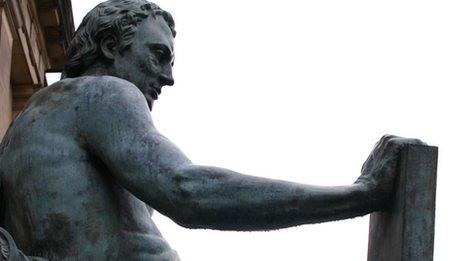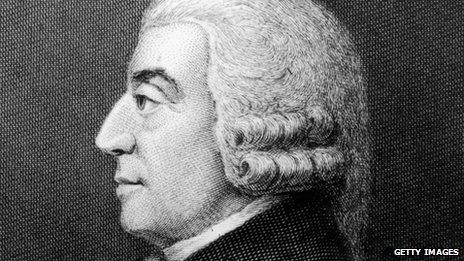After truth and reason
- Published

David Hume - and his statue in Edinburgh suggesting a link with the Classical world
Of the sundry statues on the Royal Mile in Edinburgh, my personal favourite is that depicting Robert Fergusson stepping forward eagerly on the pavement outside the Canongate Kirk.
Fergusson died hideously young - just 24 - but still contrived to leave a considerable body of poetic works, praised by Burns. Indeed, Scotland's national Bard ensured that the last resting place of his brother poet was more than an unmarked grave.
But I suspect that contemporary pedestrians, wandering up or down the Mile, would be more likely to recognise two other figures, conserved in stone. They are David Hume and Adam Smith, perhaps Scotland's greatest philosophers.
Smith is renowned today as the originator of the dismal science of economics. Entirely rightly, he has a global reputation as a thinker, writer and observer of the human condition. I love the statue, incidentally, with its little cameo references to elements of Smith's work.

What would you notice wandering down the Royal Mile in Edinburgh?
The Hume statue is comparably impressive, swathing the Scot in toga robes to suggest a link with the Classical world, with enduring thought.
Hume's philosophical work is outstanding: insightful, precise, direct. He was an iconoclast, challenging established thought and custom in a fashion which makes him eminently readable today but which scarcely contributed to his academic earning power at the time.
One comment attributed to him adds, in my view, to his appeal. Reflecting upon his capacity for controversy, he seemingly reflected that he had, despite that, made relatively few enemies - "except indeed, all the Whigs, all the Tories and all the Christians."
However, in universally irritating such power bases, Hume undoubtedly pursued his arguments with logic, reason and rhetoric. Real, thoughtful rhetoric - not shouting and bawling.
Engage his brain
Not for him a few words of unthinking abuse, crammed into a hasty online post. Yes, he could be droll. Yes, he could be wickedly ironic. But he tended to engage his brain ahead of his mouth or his pen.
Such thoughts were occasioned by an email from the Library of Scottish Philosophy anent the tone of the debate in the referendum.

David Hume - the iconoclast, challenging established thought

Adam Smith - perhaps Scotland's greatest philosophers
Smith and Hume's descendants note in respect of Scotland that no other small European country has produced a comparable range of philosophical thought.
Why then, they grieve, has the referendum debate been reduced to "radical emptiness"? In a news release, Professor Gordon Graham, the series editor, laments: "Has our great Scottish tradition of the Philosophy of Rhetoric been forgotten?"
He notes that the ancient Greek thinkers tended to separate the pursuit of truth from the skill of persuasion, thus separating philosophy and rhetoric.
By contrast, he argues, the Scottish Enlightenment philosophers, in particular, believed that truth and reason were, in themselves, the most cogent persuaders.
Modern political speeches, he reckons, create the division again, focusing on rhetoric rather than substance.
Stand by for the news release. "Prof says: we're up there with Plato!"